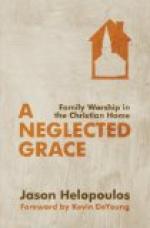To fall in love, therefore, with mere outward beauty is, to dandle with a doll, to fawn upon a picture, to rest your hopes upon a plaything, to pursue a phantom which, as soon as you embrace it, may vanish into nothing. Look not to external beauty alone; but also to the ornaments of an inward spirit, of a noble mind, and an amiable and pious heart. “If,” says the Rev. H. Harbaugh, “you will be foolish, follow the gilded butterfly of beauty, drive it a long chase; it will land you at last at some stagnant mud-pond of the highway.”
Neither is impulsive passion a true basis of marriage. This is falling in love at first sight, which often proves to be a very dangerous and degrading fall,—a fall from the clouds to the clods, producing both humiliation and misery. It is indeed a fearful leap,—a leap without judgment or forethought; and, therefore, a leap in the dark. It is too precipitate, and shows the infatuation of the victim. Falling in love is not always falling in the embraces of domestic felicity. Such leaping is an act of intoxication. The drunkard, falling in the mire, often thinks that he is embracing his best friend, whereas it is but descending to fellowship with the swine. It is blind love, which is no love, but passion without reason. It is crazy, fitful, stormy, raising the feelings up to boiling point, and bringing the affections under the influence of the high-pressure system. Consequently it is raving, frothy, of a mushroom growth, making mere bubbles, and completing its work in an evaporation of all that it operated upon, passing away like the morning cloud and the early dew.
True love is very different. It is substantial, reasonable, moral, acting according to law, temperate in all things, keeping the heart from extremes, permanent, and based upon principle. Passion, without love, may keep you in a state of pleasurable intoxication until the knot is tied, when you will soon get sober again, only to see, however, your folly and to contemplate the height from which you have fallen, and then, with the recklessness of sullen despair, to pass over into the opposite extreme of stoical indifference and misery. All emotions are transient, and hence no proper standard of judgment in the serious matter of a marriage choice. The heart, unguided by the head, is, in its emotions, like the flaming meteor that passes in its rapid, fiery train across the heavens. It flames only for a time, and soon passes away, leaving the heavens in greater darkness than before.




